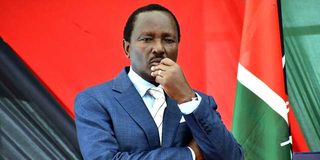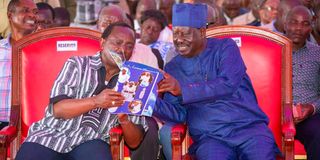Premium
2027 State House race and politics of ‘debt’: A story of Kalonzo Musyoka

Wiper leader Kalonzo Musyoka. The push by Musyoka’s allies for his endorsement for the 2027 presidential election by Azimio la Umoja One Kenya Coalition Party chief Raila Odinga has reawakened the “debt” debate in the country’s politics.
The push by Wiper leader Kalonzo Musyoka’s allies for his endorsement for the 2027 presidential election by Azimio la Umoja One Kenya Coalition Party chief Raila Odinga has reawakened the “debt” debate in the country’s politics.
Mr Musyoka has set his sights on the 2027 election, indicating that he is not ready to back Mr Odinga for a fourth time.
His allies, Senators Enoch Wambua (Kitui) and Dan Maanzo (Makueni) have challenged Mr Odinga to repay Mr Musyoka for his support in the 2013, 2017 and 2022 elections.
Mr Maanzo has said backing Mr Odinga again in 2027 could be counter-productive.
Mr Odinga’s Orange Democratic Movement (ODM) pointed out that, whereas it has no problem backing Mr Musyoka, sending“unnecessary” threats and setting conditions was ill-advised.
“Truth be told, we owe him [Mr Musyoka] a lot as he is the only leader who has genuinely stood with our party boss for all this time but the approach he is taking is wrong. Wiper party leaders should lobby quietly as they continue to build friendships,” ODM chairman John Mbadi said.
The “debt” politics date back to the 60s when first vice president Jaramogi Oginga Odinga worked with President Jomo Kenyatta.
But Mr Odinga resigned as vice president in 1966 and also quit then ruling party Kanu and joined Kenya People’s Union (KPU), paving way for the appointment of the late Joseph Murumbi and later Daniel Arap Moi who in 1978 took over as President after Mzee Kenyatta’s death and served for 24 years in power.

Azimio la Umoja leaders Kalonzo Musyoka (left) and Raila Odinga at the funeral of Mama Philomena Mutelwa Barasa, the mother of Kakamega Governor Fernandes Barasa, in Mumias East, Kakamega County.
Moi succession
In 2002 when the late Moi was headed for retirement, Mr Odinga had hoped for his support to succeed him in that year’s election having joined him through a merger between his National Development Party (NDP) and Kanu on March 18, 2002.
But Mr Moi went ahead to anoint 41-year-old Uhuru Kenyatta as his preferred heir, kicking up a storm in his Kanu with Mr Odinga leading a mass walkout to join Mr Mwai Kibaki in the National Alliance Rainbow Coalition (Narc), who emerged winner in the December 27, 2002 election, becoming the country’s third president.
However, Mr Odinga and Mr Kibaki would later fall out over differences to change the constitution, with the ODM leader leading strong opposition against the proposed constitution in 2005.
Dr Ruto has repeatedly said he played a key role in making Mr Odinga prime minister and Mr Kenyatta President, even though they have never supported his bid. During the campaigns ahead of last year’s election, Dr Ruto told his supporters that it was now his turn to be king rather than king-maker, which he successfully achieved.
Kanu Chairman Gideon Moi, whose late father Daniel arap Moi brought Mr Kenyatta to the political limelight, had been banking on the former President to clear his political path but ended up on the losing side after backing Mr Odinga’s bid. It remains to be seen whether Dr Ruto will back his deputy, Mr Rigathi Gachagua, or Prime Cabinet Secretary Musalia Mudavadi at the end of his term.





